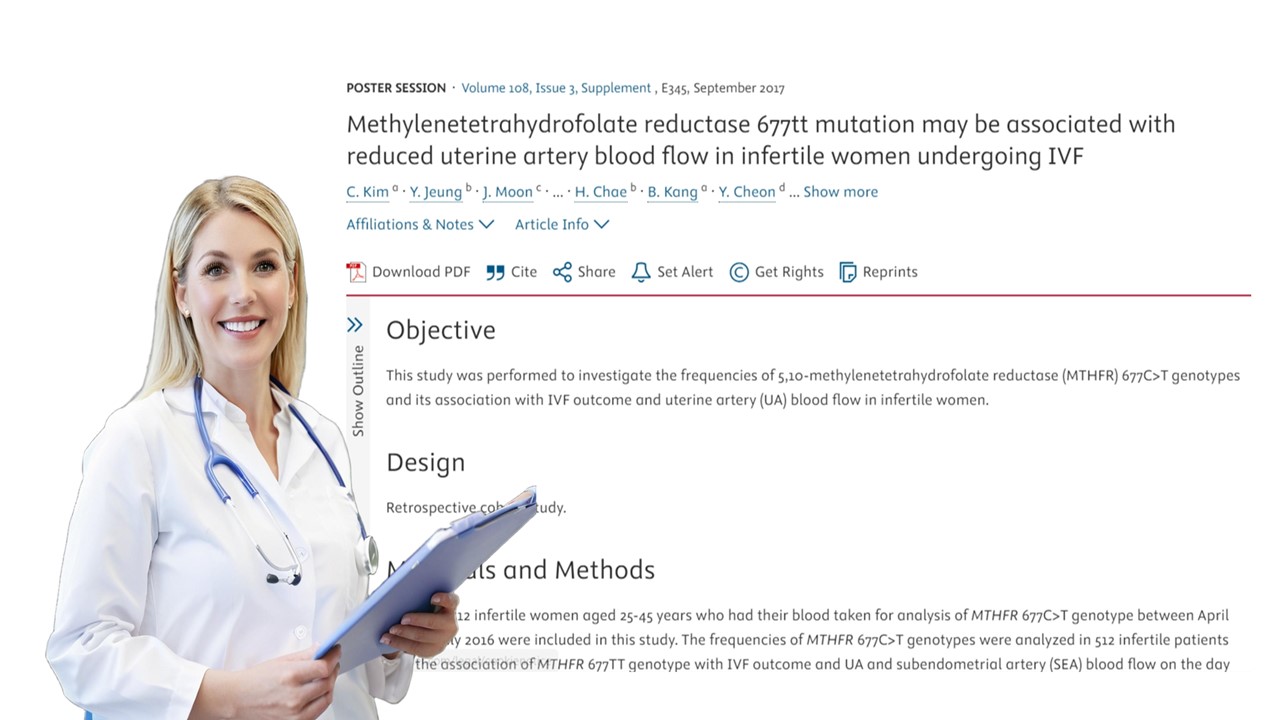On the challenging journey to parenthood, many infertile patients face numerous obstacles, and those with the MTHFR 677TT mutation encounter even greater difficulties. This seemingly minor genetic mutation acts like an invisible "tripwire," impeding the arrival of new life.

When the MTHFR gene undergoes a 677C>T mutation, it significantly impairs the body's ability to metabolize folate, leading to elevated levels of homocysteine. This is akin to obstructing the "lifeline" between the uterus and placenta, disrupting uteroplacental blood flow and reducing the chances of successful embryo implantation.

Traditional folate supplements are not very effective for this group of people because they require a complex metabolic process to be utilized by the body—a process that is precisely hindered by the MTHFR 677TT mutation.

However, hope is on the horizon. A study published in the journal Fertility and Sterility on October 19, 2021, has opened a window of hope for these patients. The study focuses on 5-methyltetrahydrofolate (5-MTHF), an active form of folate that can be directly absorbed and utilized by the body, bypassing the metabolic barrier caused by the gene mutation.

The study retrospectively analyzed 91 IVF-ET cycles at M Fertility Center in Seoul, South Korea, from May 2018 to March 2021. All patients were infertile individuals with the MTHFR 677TT genotype. Among them, 51 were in the study group, who started taking 800 micrograms of 5-MTHF orally daily 80-90 days before embryo transfer, while the remaining 40 served as the control group without supplementation.
The results showed that 5-MTHF treatment significantly improved uterine artery blood flow. On the day of embryo transfer, the uterine artery resistance index (RI) and pulsatility index (PI) of the study group were significantly lower than those of the control group, indicating that 5-MTHF effectively optimized uterine artery blood flow, creating a more favorable "soil" environment for embryo implantation.

Further analysis revealed that the embryo implantation rate in the study group was as high as 27.5%, far exceeding the 14.3% of the control group. Meanwhile, the clinical pregnancy rate of the study group was 45.1%, also significantly higher than the 27.5% of the control group.
These data fully demonstrate that the application of 5-MTHF has played a positive role in improving uterine perfusion, enhancing embryo implantation ability, and promoting pregnancy success rates, bringing real hope of childbirth to infertile patients with the MTHFR 677TT mutation.

For infertile patients with the MTHFR 677TT mutation, naturalized folate is the ideal choice for precision nutrition intervention. It is efficient, safe, and precise, especially suitable for these patients. In particular, folate that has passed Naturalization Folate certification and has reached an essentially non-toxic level, such as Magnafolate, is more suitable for folate supplementation in maternal and infant populations.

In the future, it is hoped that these findings will be widely applied in IVF-ET protocols, helping infertile patients overcome fertility barriers and embrace their own happy family lives.

Reference: Moon, S. Y. (2021). Effect of 5-methyltetrahydrofolate in infertile patients with methylenetetrahydrofolate reductase (MTHFR) 677TT mutation undergoing IVF. Fertility and Sterility. https://doi.org/10.1016/j.fertnstert.2021.07.611

 Español
Español Português
Português  русский
русский  Français
Français  日本語
日本語  Deutsch
Deutsch  tiếng Việt
tiếng Việt  Italiano
Italiano  Nederlands
Nederlands  ภาษาไทย
ภาษาไทย  Polski
Polski  한국어
한국어  Svenska
Svenska  magyar
magyar  Malay
Malay  বাংলা ভাষার
বাংলা ভাষার  Dansk
Dansk  Suomi
Suomi  हिन्दी
हिन्दी  Pilipino
Pilipino  Türkçe
Türkçe  Gaeilge
Gaeilge  العربية
العربية  Indonesia
Indonesia  Norsk
Norsk  تمل
تمل  český
český  ελληνικά
ελληνικά  український
український  Javanese
Javanese  فارسی
فارسی  தமிழ்
தமிழ்  తెలుగు
తెలుగు  नेपाली
नेपाली  Burmese
Burmese  български
български  ລາວ
ລາວ  Latine
Latine  Қазақша
Қазақша  Euskal
Euskal  Azərbaycan
Azərbaycan  Slovenský jazyk
Slovenský jazyk  Македонски
Македонски  Lietuvos
Lietuvos  Eesti Keel
Eesti Keel  Română
Română  Slovenski
Slovenski  मराठी
मराठी  Srpski језик
Srpski језик 








 Online Service
Online Service